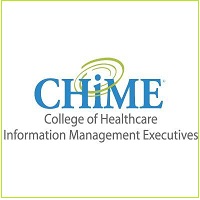 The College of Healthcare Information Management Executives (CHIME) (@CIOCHIME), along with nine (9) other healthcare provider organizations, sent a letter to the US Department of Health and Human Services (HHS) Secretary, Xavier Becerra, requesting that HHS offer providers an additional year to comply with the October 6th, 2022 information sharing deadline.
The College of Healthcare Information Management Executives (CHIME) (@CIOCHIME), along with nine (9) other healthcare provider organizations, sent a letter to the US Department of Health and Human Services (HHS) Secretary, Xavier Becerra, requesting that HHS offer providers an additional year to comply with the October 6th, 2022 information sharing deadline.
CHIME has been an ardent supporter of information sharing – and continues to advocate for patients’ ability to access their healthcare information in a digital format. In order to meet the rapidly approaching deadline, CHIME members have been working diligently, with scarce resources at times, to ensure they are prepared to be in compliance when the upcoming deadline goes into effect.
“CHIME members remain steadfast in their dedication to be a trusted partner for patients and safeguard their ability to access their healthcare records, but it’s clear that more time is needed to ensure that providers have a thorough understanding of these important policies,” said Russ Branzell, President and CEO of CHIME. “There has not been enough guidance on best practices and potential enforcement.” Overwhelming feedback from CHIME members, representing a broad range of providers from across the healthcare continuum – including their electronic health record (EHR) vendors, indicates that they are not fully prepared for the Oct. 6 deadline.
With clinician burnout rates at an all-time high, CHIME believes that moving forward with unclear and inconsistent information sharing about data requirements could further strain healthcare providers, their support staff, and may inadvertently undermine HHS’ goals to reduce provider burden, improve interoperability, and empower patients with their information. Branzell stated that the “need for clear guidance is so important, and we need to make sure that all healthcare providers fully understand the many nuances of these complex policies.”
Additionally, there are many small and rural providers that rely heavily on their EHR vendors for regulatory compliance support. While several EHR vendors have initiated information sharing programs for their customers, there are still hundreds of smaller health information technology (health IT) vendors not yet ready to meet these complex requirements.
In addition to postponing the compliance deadline, the letter also requests that HHS use corrective action warning communication to providers – especially before they impose any financial penalties or begin formal investigations. CHIME urges HHS to ensure that providers and clinicians have the guidance, education, and technology to support these new policies before full implementation and enforcement of information sharing regulations. We believe strongly in information sharing and want to see these policies succeed. A successful implementation of information sharing necessitates that all stakeholders have the critical tools, knowledge, guidance, and systems in place to meet the requirements of the deadline. This is simply not the case for the majority of the providers represented by CHIME.
Download the Letter from 10 Industry Stakeholders to the US Department of Health and Human Services Urging Agency To Postpone Information Sharing Compliance Deadline.
For any questions on the letter, email policy@chimecentral.org.
About CHIME
The College of Healthcare Information Management Executives (CHIME) is an executive organization dedicated to serving chief information officers (CIOs), chief medical information officers (CMIOs), chief nursing information officers (CNIOs), chief innovation officers (CIOs), chief digital officers (CDOs) and other senior healthcare IT leaders. With more than 5,000 members in 56 countries plus two U.S. territories and over 150 healthcare IT business partners and professional services firms, CHIME and its three associations provide a highly interactive, trusted environment enabling senior professional and industry leaders to collaborate, exchange best practices, address professional development needs and advocate the effective use of information management to improve the health and care in the communities they serve.
